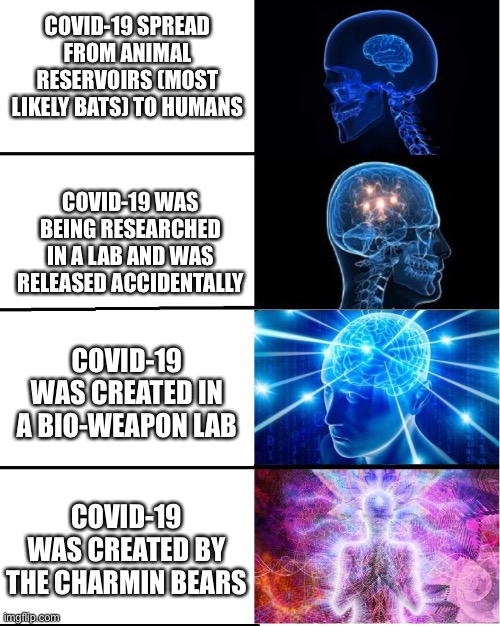Do you know the galaxy brain meme? It first popped up after the 2016 election and gained popularity through the onslaught of Covid-19 conspiracy theories, but can be used for anything. The idea is to show just how different of a level your is working on than the average bear’s. Most of the memes point out that this sort of thinking usually makes people sound like deranged lunatics or arrogant assholes.

The longer I work on this side of the sports radio business, the more I find those same kinds of galaxy brain delusions getting in managers’ ways.
The formula for what makes great sports radio great is pretty simple. You need entertaining people, engaging topics, and interesting points of view. If those people can attract and retain an audience and then managers surround them with people that can convince businesses that this audience will listen to what this station or host has to say, you have turned great sports radio into successful sports radio.
How many conversations have you had with people that talk about wanting to “evolve sports radio”? Being on this side of the business, I have probably had more than you have, but I’d bet good money that you have probably had a lot of those conversations too.
Evolution for our format is an admirable goal, and there are areas where it is needed, but the formula is pretty good. Trying to change the formula for success isn’t evolution. It is galaxy-braining a solution to a problem that doesn’t exist.
This shows up the most in markets with a single sports radio station. Now, I am not pointing fingers at anyone or any one market specifically here. This is just pointing out where it is easiest to fall into this kind of trap.
Good programmers know that their competition isn’t limited to just other stations in the sports format. They know it isn’t limited to just terrestrial radio. In the best-case scenario, that leads them to expand their offerings and create quality content that lets the audience access and interact with the brand across multiple platforms.
Unfortunately, there are scenarios that are pretty far from the best case.
There are a lot of different things overthinking the format can look like. All of them come back to the same thing. The most basic things that our audience likes about sports talk radio get ignored.
Spoken word formats, whether news talk or sports talk, have the same advantage over podcasts or written content: immediate reaction in real time. That can be reaction to an event everyone is talking about or to something that was just said on air. Either way, the immediate conversation with tens of thousands of people is what makes radio…well, radio. Trying to figure out what makes Joe Rogan, Bill Simmons, or Alex Cooper so successful and applying it to radio misses the point of the platform itself.
Alienating your audience can also be a result of overthinking the format. When I first made the switch from rock to sports talk, I was dead set on adding as much creativity to every topic as I could. I wanted more bits and less analysis.
The best thing that could have happened to me in that time was having a partner sit me down and say “Demetri, sometimes they just want to hear us talk about f***ing basketball.”
“But that’s boring,” I said.
“Not to them. That is the reason they are here,” he responded.
That doesn’t mean I am advocating for the “stick to sports” approach to the format. I tell people all the time that if you are applying for a sports talk job and all you care about is sports or if you are applying for a news talk job and all you care about is politics, you are too boring to entertain anyone. There is always room for a good pop culture reference and plenty of opportunities to talk about sports in a larger cultural context.
When we overthink what talk radio formats are and get so caught up in “evoloving the format,” we forget that this isn’t nearly as boring and stodgy as we fear it is. There is a reason Draymond Green’s ideal of what media conversations about basketball should sound like was so laughable. It’s because sports radio learned more than a decade ago that no one is sticking around for a lecture. Let’s give ourselves some credit for what has actually happened and not act like Pat McAfee sounds like those night time shows from the mid-80s.
The other galaxy brain downfall of sports radio leaders is much more dire for the format. It comes from looking around at other formats and deciding sports is a loser. This is a niche format that requires investment in order to succeed. The path to profit is much simpler in music formats because what does it cost to load Foghat’s “Slow Ride,” a liner, and Van Halen’s “Running With the Devil” into a computer and hit play?
What less expensive music formats cannot offer is the connection to the individual talents. Sure, those stations may have a morning show that listeners are dedicated too, but if your format is built to be background noise, what influence can the voices on air have with listeners? That is why sports radio is by no means a loser just because the appeal is more narrow.
More than any other type of media, talk radio formats are a people business. I would argue that sports radio even moreso than news talk, because that is a format built on confirmation bias. As long as you’re on the correct side of the aisle, the audience will keep coming back.
Investing in people is only half the battle. Ego management is so important too. A galaxy brain type manager may not outright say that sports radio is a loser, but their message is clear when asking talent why they cannot perform like the classic rock or hot AC station does. That is so demeaning and disheartening.
Does your station have a loyal, reliable following? Is it profitable? It’s not where the conversation ends, but if the answer to both of those questions is yes, your station is in pretty good shape.
The galaxy brain approach to problem solving is so tempting. It is human nature to love to hear how smart we are. Giving into that temptation is rarely a good idea though. If we are serious about evolving the sports talk format and solving real problems, the best thing a leader can do is check their ego and think honestly about what is and isn’t broken.

Demetri Ravanos is a columnist and features writer for Barrett Media. He is also the creator of The Sports Podcast Festival, and a previous host on the Chewing Clock and Media Noise podcasts. He occasionally fills in on stations across the Carolinas in addition to hosting Panthers and College Football podcasts. His radio resume includes stops at WAVH and WZEW in Mobile, AL, WBPT in Birmingham, AL and WBBB, WPTK and WDNC in Raleigh, NC.
You can find him on Twitter @DemetriRavanos or reach him by email at DemetriTheGreek@gmail.com.






